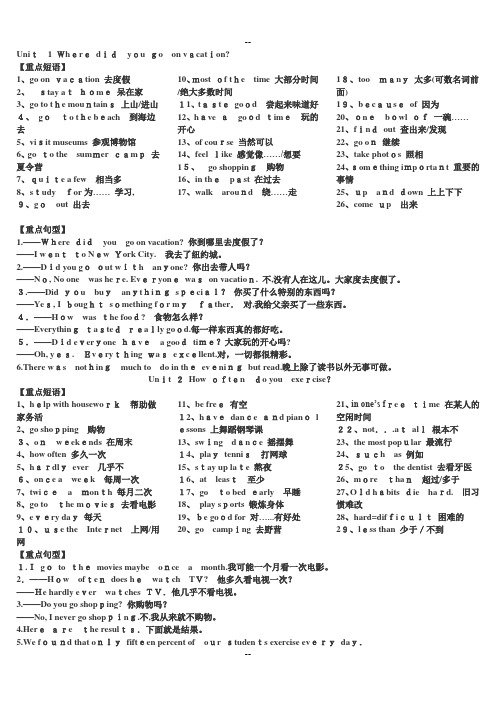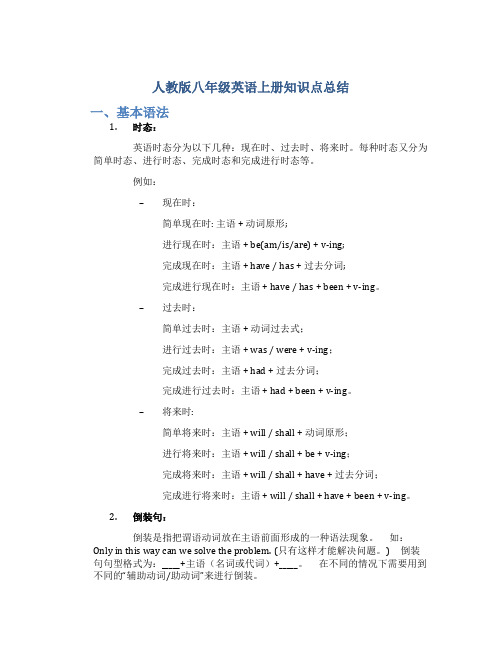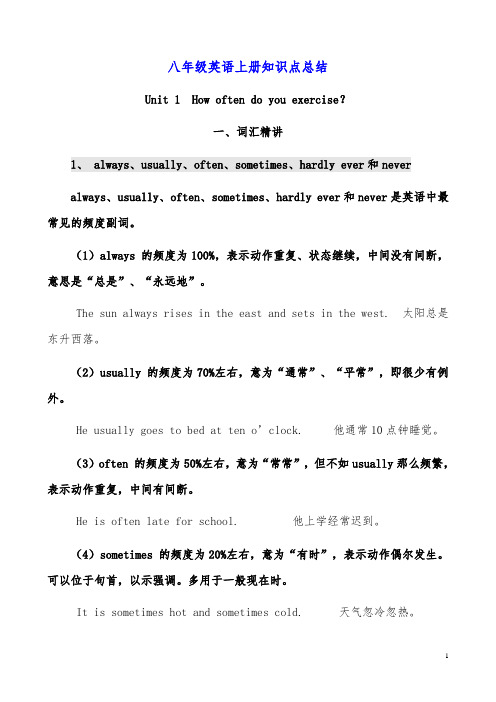人教版八年级上册英语知识点总结
- 格式:doc
- 大小:355.50 KB
- 文档页数:19

Unit 1 Wheredidyou go on vacation? 【重点短语】1、go on vacation 去度假2、stay athome呆在家3、go to the mountains上山/进山4、goto the beach到海边去5、visit museums 参观博物馆6、go to the summer camp去夏令营7、quite a few相当多8、studyfor为…… 学习,9、goout 出去10、most of the time 大部分时间/绝大多数时间11、tastegood尝起来味道好12、have agood time玩的开心13、of course 当然可以14、feel like 感觉像……/想要15、go shopping购物16、in thepast 在过去17、walk around绕……走18、toomany太多(可数名词前面)19、becauseof 因为20、onebowl of一碗……21、findout 查出来/发现22、go on继续23、take photos 照相24、something important 重要的事情25、up and down 上上下下26、come up出来【重点句型】1.——Where didyou go on vacation? 你到哪里去度假了?——I wentto New York City.我去了纽约城。
2.——Did you goout with anyone? 你出去带人吗?——No, No one was here. Everyonewason vacation. 不,没有人在这儿。
大家度去度假了。
3.——Did you buyanythingspecial?你买了什么特别的东西吗?——Yes, I boughtsomething for myfather.对,我给父亲买了一些东西。
4.——How was the food?食物怎么样?——Everythingtastedreally good.每一样东西真的都好吃。

人教版八年级上册英语语法、短语和知识点总结归纳一、语法1. 一般现在时- 用法:表示经常性或惯性的动作或状态。
- 结构:主语 + 动词原形 (+ 其他成分)- 示例:I play soccer every weekend.2. 一般过去时- 用法:表示过去某个时间点或一段时间内发生的动作或存在的状态。
- 结构:主语 + 动词过去式 (+ 其他成分)- 示例:She watched a movie last night.3. 现在进行时- 用法:表示现在正在发生的动作。
- 结构:主语 + am/is/are + 动词-ing (+ 其他成分)- 示例:They are studying for the exam.4. 现在完成时- 用法:表示动作或状态发生在过去某个时间点,但与现在有关。
- 结构:主语 + have/has + 动词过去分词 (+ 其他成分)- 示例:I have finished my homework.5. 情态动词- 用法:表示能力、意愿、可能性等。
- 常见的情态动词有 can, could, may, might, must, should, ought to 等。
- 示例:He should go to bed early.二、短语1. as well as- 用法:表示两个事物同时存在或发生。
- 示例:She can speak English as well as Chinese.2. in order to- 用法:为了做某事。
- 示例:They woke up early in order to catch the train.3. by the way- 用法:用于引入一个新的话题或问题。
- 示例:By the way, have you seen the latest movie?三、知识点1. 直接引语和间接引语- 直接引语:用引号括起来的原话。
- 间接引语:将直接引语转述为陈述句或疑问句。

人教版八年级英语上册知识点总结一、基本语法1.时态:英语时态分为以下几种:现在时、过去时、将来时。
每种时态又分为简单时态、进行时态、完成时态和完成进行时态等。
例如:–现在时:简单现在时: 主语 + 动词原形;进行现在时:主语 + be(am/is/are) + v-ing;完成现在时:主语 + have / has + 过去分词;完成进行现在时:主语 + have / has + been + v-ing。
–过去时:简单过去时:主语 + 动词过去式;进行过去时:主语 + was / were + v-ing;完成过去时:主语 + had + 过去分词;完成进行过去时:主语 + had + been + v-ing。
–将来时:简单将来时:主语 + will / shall + 动词原形;进行将来时:主语 + will / shall + be + v-ing;完成将来时:主语 + will / shall + have + 过去分词;完成进行将来时:主语 + will / shall + have + been + v-ing。
2.倒装句:倒装是指把谓语动词放在主语前面形成的一种语法现象。
如:Only in this way can we solve the problem. (只有这样才能解决问题。
) 倒装句句型格式为:_____+主语(名词或代词)+_____。
在不同的情况下需要用到不同的“辅助动词/助动词”来进行倒装。
3.被动语态:被动语态就是在句子中表达动作的承受者(即主语)的语态。
结构为:被(或受)动责任的动词(to be) + 过去分词。
如:The book was written by him.(这本书是由他写的。
)4.虚拟语气:虚拟语气是指在表示假设,愿望,建议等语气时所使用的一种语态形式。
其结构为:主语+should/could/might/would+(have)+动词原形。
如: If I were you, I would buy this dress(如果我是你,我会买这件衣服。

人教版八年级英语上册知识点总结和复习要点一、词汇与短语1重点词汇熟练掌握课本中的新词汇,包括名词、动词、形容词、副词等,并理解其在句子中的用法。
例子:名词:environment(环境)、experience(经历)、relationship(关系)动词:encourage(鼓励)、explain(解释)、expect(期待)形容词:frequent(频繁的)、generous(慷慨的)、responsible(有责任心的)副词:certainly(当然)、fortunately(幸运地)、however (然而)2常用短语记忆并熟练运用课本中的常用短语和固定搭配,提高表达的准确性和流利性。
例子:短语:in the end(最后)、all the time(一直)、as a result (结果)固定搭配:be proud of(以...为傲)、deal with(处理)、pay attention to(注意)二、句型与语法1基本句型熟练掌握五种基本句型,包括主语+谓语、主语+谓语+宾语、主语+谓语+间接宾语+直接宾语、主语+谓语+宾语+宾语补足语、主语+系动词+表语。
例子:主语+谓语:She sings.(她唱歌。
)主语+谓语+宾语:I like apples.(我喜欢苹果。
)主语+谓语+间接宾语+直接宾语:He gave me a book.(他给了我一本书。
)主语+谓语+宾语+宾语补足语:I found the book interesting.(我发现这本书很有趣。
)主语+系动词+表语:She is beautiful.(她很漂亮。
)2时态深入学习并掌握现在完成时、过去进行时、一般将来时、过去将来时等时态的用法和形式。
例子:现在完成时:I have already seen that movie.(我已经看过那部电影了。
)过去进行时:They were playing football when I called them.(我打电话给他们时,他们正在踢足球。

八年级英语上册知识点总结Unit 1 How often do you exercise?一、词汇精讲1、 always、usually、often、sometimes、hardly ever和neveralways、usually、often、sometimes、hardly ever和never是英语中最常见的频度副词。
(1)always 的频度为100%,表示动作重复、状态继续,中间没有间断,意思是“总是”、“永远地”。
The sun always rises in the east and sets in the west. 太阳总是东升西落。
(2)usually 的频度为70%左右,意为“通常”、“平常”,即很少有例外。
He usually goes to bed at ten o’clock. 他通常10点钟睡觉。
(3)often 的频度为50%左右,意为“常常”,但不如usually那么频繁,表示动作重复,中间有间断。
He is often late for school. 他上学经常迟到。
(4)sometimes 的频度为20%左右,意为“有时”,表示动作偶尔发生。
可以位于句首,以示强调。
多用于一般现在时。
It is sometimes hot and sometimes cold. 天气忽冷忽热。
Sometimes he does it this way and sometimes he does it that way.他有时这样做,有时那样做。
(5)hardly ever 的频度为5%左右,意为“几乎不”、“偶尔”,表频率,位置是“行前be后”。
I hardly ever go out these days. 这些天我几乎不出门。
(6)never 的频度为0,意为“从来不”、“永不”。
My parents are never late for work. 我父母上班从来不迟到。

人教版八年级英语上册知识点总结人教版八年级英语上册知识点句子成分和类型1.主语:句子所陈述的对象。
2.谓语:主语发出的动作。
一般是有动作意义的动词。
3.宾语:分为动词宾语和介词宾语,属于动作的承受者。
4.系动词:表示状态或状态变化的动词,没有实际的动作意义。
如 be,感官系动词(look, sound, smell, taste 和 feel)、保持类系动词(keep,stay 和 remain)、状态变化类系动词(become、get、turn 和 go)等。
5.表语:紧跟系动词后面的成分。
6.定语:修饰名词或代词的成分。
7.状语:修饰形容词、副词、动词或句子的成分。
8.补语:分为宾语补足语和主语补足语。
是对宾语和主语的补充说明,与其有主动或被动的逻辑关系。
例如:You should keep the room clean and tidy.你应该让屋子保持干净整洁。
(You是主语, should keep是谓语,the room是宾语,clean and tidy是宾语补足语。
)This kind of food tastes delicious.这种食物吃起来很可口。
(This kind of food是主语, tastes是系动词, delicious是表语。
)注意:主语、谓语、宾语、系动词、表语、补语是一个句子的主干成分;定语和状语是一个句子的修饰性成分,不是主干成分。
9.简单句的基本形式是由一个主语加一个谓语构成。
10.复合句由一个主句和一个或一个以上的从句构成。
11.两个或两个以上的简单句用并列连词连在一起构成的句子,叫做并列句,其基本结构是“简单句+并列连词+简单句”。
一般疑问句一、不用疑问词,但需要用yes或no回答的疑问句,叫一般疑问句。
句末用问号“?”。
一般疑问句的基本用法及结构一般疑问句用于对某一情况提出疑问,通常可用yes和no来回答,读时用升调。
其基本结构是“be / have / 助动词+主语+谓语(表语)”:Is he interested in going? 他有兴趣去吗?Have you ever been to Japan? 你到过日本吗?Does she often have colds? 她常常感冒吗?Did you ask her which to buy? 你问没问她该买哪一个?二、陈述句变一般疑问句的方法1.动词be的疑问式:动词be根据不同的时态和人称可以有am, is, are,was, were等不同形式,可用作连系动词(表示“是”、“在”等)和助动词(用于构成进行时态和被动语态等),但不管何种情况,构成疑问式时,一律将动词be的适当形式置于句首:句型:Be动词+主语~?Is your father angry?你父亲生气了吗?Yes,he is.是的,他生气了。
人教版八年级英语上册知识点总结(全)Unit 1 How often do you exercise?一、词汇精讲1、 always、usually、often、sometimes、hardly ever和neveralways、usually、often、sometimes、hardly ever和never是英语中最常见的频度副词。
(1)always的频度为100%;表示动作重复、状态继续;中间没有间断;意思是“总是”、“永远地”。
The sun always rises in the east and sets in the west. 太阳总是东升西落。
(2)usually 的频度为70%左右;意为“通常”、“平常”;即很少有例外。
He usually goes to bed at ten o’clock. 他通常10点钟睡觉。
(3)often的频度为50%左右;意为“常常”;但不如usually那么频繁;表示动作重复;中间有间断。
He is often late for school. 他上学经常迟到。
(4)sometimes的频度为20%左右;意为“有时”;表示动作偶尔发生。
可以位于句首;以示强调。
多用于一般现在时。
It is sometimes hot and sometimes cold. 天气忽冷忽热。
Sometimes he does it this way and sometimes he does it that way.他有时这样做;有时那样做。
(5)hardly ever 的频度为5%左右;意为“几乎不”、“偶尔”;表频率;位置是“行前be后”。
I hardly ever go out these days. 这些天我几乎不出门。
(6)never 的频度为0;意为“从来不”、“永不”。
My parents are never late for work. 我父母上班从来不迟到。
人教版八年级上册英语知识点总结Unit 1 My day1. 词汇day, in the afternoon, have breakfast, skate, swim, play basketball, get up, go to school, have lunch, do homework, go home, have dinner2. 语法1) 现在进行时态的构成:主语 + am/is/are + 动词-ing例如:He is doing his homework now.2) 现在进行时态的用法:表示说话者正在进行的动作例如:I am swimming in the pool.3. 句型What do/does sb. do in the morning/afternoon/evening?Unit 2 This is my sister1. 词汇sister, brother, family, mother, father, grandfather, grandmother, aunt, uncle, cousin, baby, daughter, son, children, parents, the, a, an, and, but2. 语法1) 形容词性物主代词的用法:my, your, his, her, its, our, your, their例如:This is my father.2) 人称代词和物主代词的用法例如:She is my sister. This is her book.3. 句型This is my father/mother/brother/sister.Unit 3 Is this your skirt1. 词汇skirt, this, shirt, hat, dress, sweater, T-shirt, trousers, shoe, cap, socks, the, a, an, and, but 2. 语法1) 物主代词的用法:my, your, his, her, its, our, your, their例如:This is my skirt.2) 物主代词和名词的用法例如:This is my skirt. Is this your skirt?3. 句型Is this/that your skirt/dress/T-shirt?Unit 4 What are you doing?1. 词汇doing, read, writing, making, swimming, riding, drawing, singing, cooking, cleaning2. 语法现在进行时的用法,在口语句中用于表示说话瞬间正在发生的动作。
最新人教版八年级上册英语知识点总结成为英语小能手快速提高听说读写能力最新人教版八年级上册英语知识点总结英语是一门世界通用的语言,对于学习者而言,掌握好英语是非常重要的。
本文将为大家总结人教版八年级上册英语的知识点,帮助大家快速提高听说读写能力。
一、语法知识1. 一般现在时(Simple Present Tense):用于描述经常性的动作或客观事实。
例句:I often go to school by bus.2. 一般过去时(Simple Past Tense):用于描述过去发生的动作或状态。
例句:She watched a movie last night.3. 一般将来时(Simple Future Tense):用于表示将来要发生的动作或情况。
例句:I will visit my grandparents next week.4. 现在进行时(Present Continuous Tense):用于表示现在正在进行的动作。
例句:They are playing football in the park.5. 现在完成时(Present Perfect Tense):用于表示过去发生但与现在有关的动作。
例句:We have lived here for five years.6. 情态动词(Modal Verbs):用于表示能力、允许、必须、愿意等情态。
例句:You should finish your homework on time.7. 被动语态(Passive Voice):用于强调动作的承受者而不是执行者。
例句:The book was written by a famous author.二、词汇积累1. 常用动词(Verbs):如read、write、speak等。
2. 日常生活词汇(Daily Life Vocabulary):如food、clothes、weather等。
3. 时间词汇(Time Vocabulary):如Monday、morning、year 等。
人教版八年级上册英语知识点汇总234钱”。
人(sb.) spend 时间/钱(in) doing“花费多少时间来做某事”。
pay 的主语必须是人,而“花钱买某物”为pay...for...10. however 副词,意为“然而,可是”,表示转折关系,可放在句首、句中、句末。
Unit3 I’m more outgoing than my sister.重点语法】1. 形容词和副词的比较等级(1)形容词和副词的原形就是原级(2)比较级,表示较……或更……(3)最高级,表示最...。
2. 比较级句型:(1)A + be动词+形容词的比较级+than +B “A比B更……”(注意:A与B必须是同级的,即必须是人与人,物与物进行对比)(2)“A+实意动词+副词比较级+ than + B”表示“A 比B…”(3)比较A ,B两人/两事物问其中哪一个较…...时用句型:“Who/which +谓语动词+ adj./adv.比较级,A or B ?”Who is thinner, Jenny or Mary?3. 比较级的特殊用法(1)“比较级+and+比较级”,意为“越来越”。
多音节比较级用“more and more+原级”(2)“the+比较级(…), the+比较级(…)”意思是:”越…越…”The more, the better.(3)主+ is + the 形容词比较级+of the two+名复“主语是两者中较......的”4. 两者在某一方面相同:A+谓语动词/be动词+as+ adj./adv.原级+ as+ B.Helen is as tall as Amy.Peter studies as hard as Tom.表示两者在某一方面不及另一方时,用“not as/so+形容词或副词原级+as”I am not as tall as my sister.5. 形容词,副词比较级前的修饰语。
人教版八年级上册知识点汇总与习题Unit1 Where did you go on vacation?短语归纳go on vacation去度假stay at home待在家里go to the mountains去爬山go to the beach去海滩visit museums 参观博物馆go to summer camp去参观夏令营quite a few相当多study for为……而学习go out出去most of the time大部分时间taste good尝起来很好吃have a good time玩得高兴of course当然in the past在过去feel like给……的感觉;感受go shopping去购物walk around四处走走because of因为one bowl of… 一碗…… the next day第二天drink tea喝茶find out找出;查明go on继续take photos照相something important重要的事up and down上上下下come up出来buy sth. for sb. / buy sb. sth.为某人买某物taste + adj. 尝起来…… look+adj. 看起来……nothing…but+动词原形除了……之外什么都没有seem+(to be)+ adj. 看起来……arrive in+大地点/ arrive at+小地点到达某地decide to do sth.决定去做某事try doing sth.尝试做某事/ try to do sth.尽力去做某事forget doing sth.忘记做过某事/ forget to do sth.忘记做某事enjoy doing sth.喜欢做某事want to do sth.想去做某事start doing sth.开始做某事stop doing sth. 停止做某事dislike doing sth. 不喜欢做某事keep doing sth.继续做某事Why not do. sth.?为什么不做……呢?so+adj.+that+从句如此……以至于……tell sb. (not) to do sth. 告诉某人(不要)做某事语法讲解1. go on vacation 度假vacation相当于holiday,但vacation表示长的假期。
4. something interesting有趣的东西1)something,anything,nothing,everything是指物的不定代词。
somebody,someone,anybody,anyone,nobody,everybody,everyone是指人的不定代词。
somewhere,anywhere,nowhere,everywhere是指地点的不定代词。
2)当形容词修饰不定代词、不定副词时,放于其后;something special; somewhere wonderful. 3)不定代词、不定副词做主语时,谓语动词用第三人称单数。
如:Is everybody here? 大家都到齐了吗?4)something,somebody,someone,somewhere用于肯定句及表示请求或建议的疑问句中anything,anybody,anyone,anywhere用于否定句、疑问句及条件状语从句中。
如:Did you do anything interesting? 你做了有趣的事吗?(表疑问)Why don’t you visit someone with me? 你为什么不跟我一起去拜访下某个人呢?(表建议)If anything happens, please tell me. 如果有事情发生,请告诉我。
6.buy sth. for sb. 或buy sb. sth 如:buy some books for me. = buy me some books.7.提建议的句子:8. ride bicycles 骑自行车①What/ how about +doing sth.? 如:What/ How about going shopping?②Why don’t you + do sth.? 如:Why don’t you go shopping?③Why not + do sth. ? 如:Why not go shopping?④Let’s + do sth. 如:Let’s go shopping⑤Shall we/ I + do sth.? 如:Shall we/ I go shopping?13. 辨析:get to/reach/arrive 都是“到达“的意思get to+地点=reach+地点= arrive at+地点(小)=arrive in+地点(大)注意:若他们后面要加地点副词here, there, home等,则不需要加介词。
14.nothing...but...意为“除......之外;只有”,如:I have nothing to do but watch TV all day long. 我整天除了看电视什么也没干。
15. feel like 意为:“感受到;摸起来”,后跟宾语从句或名词。
如:I felt like I was a bird. 我感觉我是一只鸟。
另外,构成短语 feel like doing sth.意为“想做某事”。
如:I feel like eating.我想吃东西。
16. enjoy doing sth . 喜欢做…;乐意做…enjoy oneself 过得愉快=have fun/have a good time.19. I wonder what life was like here in the past. 我想知道过去这里的生活是什么样的奇迹;令人惊讶的事情 如:No wonder! 难怪;不足为奇!(v) 惊讶 如:wonder at sth. ; wonder to do sth.感到疑惑;想知道 如:I wonder where they are going.There is little sugar in the bottle. Can you get some?Still no one seemed to be bored. 仍然没有人感到烦闷。
1)seem 意为“好像;似乎;看来”,是个连系动词,构成的短语有:seem to do sth. 好像做某事 如: They seem to wait for you.. 他们似乎在等你。
seem (to be )+adj. 似乎...... 如: He seemed ( to be) ill yesterday. 昨天他似乎病了。
It seems that + 从句 似乎...... 如: It seems that he was ill yesterday. 昨天他似乎病了。
其他表示状态的系动词有:feel(觉得); keep (保持);stay (保持);look (看来像...);smell (闻起来)sound (听起来……)taste (尝起来……)2) bored (adj),意为“感到厌倦的、无聊的”,其主语是某人;boring(adj),意为“令人厌倦的、无聊的”其主语是某物。
如:I got bored with the boring work. 我对这无聊的工作感到厌倦。
相类似的词语还有interested/ tired/ excited/ amazed/surprisedinteresting/ tiring/ exciting/ amazing/surprising22. decide (v )决定 decide to (not) do sth. = make a decision (not) to do sth.decision(n) decide on doing sth. 决定做某事如:Li Lei has decided to go to Beijing . 李雷已经决定去北京。
23. Because o f the bad weather, we couldn’t see anything below.1) because of + 名词/代词/名短 I had to move because of my job. 因为工作的原因because + 从句 如:I do it because I like it. 我做这件事是因为我喜欢。
2)below 意为“在......下面;低于”,其反义词为 above ,意为“在......上面;高于”24. 形容词/副词+enough 如:wet/quietly enough 足够漂亮enough enough +名词 如:enough umbrellas 足够的雨伞足够 (形/副)+enough+ (名) to do sth. 足够…去做…如:I have enough money to go to Beijing. 我有足够的钱去北京。
She is not old enough to go to school. 她年龄不够,不能去上学。
同义句: She is too young to go to school. (t oo… to… :太… 而不能…)She is so young that she can’t go to school.so+形/副+that 从句:She is so popular that everyone likes her.such+名短+ that 从句:She is such a popular girl that... 如:He gets up early so that he can catch the early bus.如:The child (herself) usually wears the clothes (herself).27.What a difference a day makes! 一天的差异多大啊!make a difference in…:对…有影响What a/an + adj.+ n(单)+主+谓!或What + adj. +n(复不)+主+谓!How+ adj. +主+谓(联系动词)!或How + adv+主+谓(实义动词)!Unit2 How often do you exercise?短语归纳help with housework帮助做家务on weekends在周末how often多久一次hardly ever几乎从不once a week每周一次twice a month每月两次every day每天be free有空go to the movies去看电影use the Internet用互联网swing dance摇摆舞play tennis打网球stay up late熬夜;睡得很晚at least至少have dance and piano lessons上舞蹈课和钢琴课go to bed early早点睡觉play sports进行体育活动be good for对……有好处go camping去野营not…at all一点儿也不…… in one’s free time在某人的业余时间the most popular最受欢迎的such as比如;诸如old habits die hard积习难改go to the dentist去看牙医morn than多于;超过less than少于help sb. with sth.帮助某人做某事How about…? ......怎么样?/ ……好不好?want sb. to do sth.想让某人做某事How many+可数名词复数+一般疑问句?……有多少……?主语+find+that从句. ……发现…… spend time with sb.和某人一起度过时光It’s+ adj.+ to do sth. 做某事的……的。